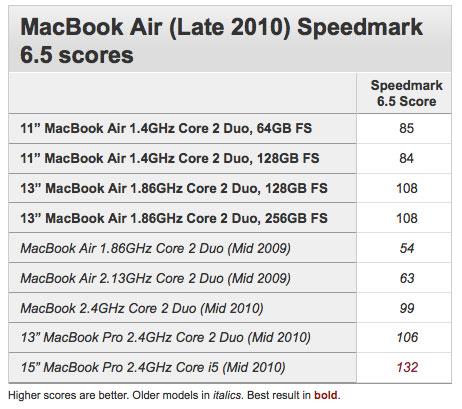Benchmarks show Apple's 13-inch MacBook Air comparable to MacBook Pro
Macworld this week published the results of a thorough benchmark of Apple's new line of MacBook Air notebooks. Testing with Speedmark 6.5 found that the new models, despite having slower clock speeds than their predecessors, have significantly improved performance due to their reliance on flash storage.
Even when compared with the MacBook Pro, the flash storage helped the new 13-inch MacBook Air achieve a Speedmark 6.5 score higher than the 13-inch MacBook Pro with a 2.4GHz processor, released in mid-2010.
The new 1.86GHz 13-inch MacBook Air doubled its Speedmark score to 108, up from the score of 64 that the 2009 1.86GHz 13-inch MacBook Air achieved. Many of the gains came in drive tests, where it was found that the new lightweight notebook took 13 seconds to copy a 1GB file, compared with the 69 seconds that the 4200rpm hard drive of the previous model took.
Graphics performance was also improved, thanks to the nVidia GeForce 320M integrated chip. A test of Call of Duty 4 found that the new MacBook Air displayed more than three times as many frames per second as the nVidia GeForce 9400M found in the 2009 MacBook Air.
"Interestingly, the new 1.86GHz MacBook Air outperforms its predecessor in processor intensive tasks as well, even though they both use a Core 2 Duo processor with the same speed rating," author James Galbraith wrote. "iTunes encoding, Photoshop, HandBrake, MathematicaMark, and CineBench CPU tests were markedly faster on the new system. The new 1.86GHz MacBook Air was even faster than the previous 2.13GHz MacBook Air in all of those same tasks, despite the older system’s supposedly faster Core 2 Duo processor."
The tests also found that the new 13-inch MacBook Air with a 1.86GHz processor is about 27 percent faster in the Speedmark 6.5 performance when compared to the smaller, 11.6-inch model with a 1.4GHz processor. The larger notebook was faster in all tests except for duplicating a 1GB file — in both cases on that test, the integrated flash storage accomplished the task in just 13 seconds.
And the mid-2010 13-inch MacBook Pro, with a 2.4GHz Core 2 Duo processor from mid-2010, reached a score of 106, two points less than the 108 that the 13-inch MacBook Air with a 1.86GHz processor received.
The MacBook Air does not stand a chance, however, when compared with the 15-inch MacBook Pro with an Intel Core i5 processor. In tests that could take advantage of the faster processor's HyperThreading technology, the 15-inch MacBook Pro earned scores twice as fast as the 13-inch MacBook Air, and nearly three times as fast as the 11-inch MacBook Air.
The mid-2010 15-inch MacBook Pro with a Core i5 processor earned a Speedmark 6.5 score of 132, making it the best of the Apple notebooks tested.
Macworld also did a stress test on the batteries of the new MacBook Air notebooks. It found that the 11-inch model looped a movie at full-screen full brightness and volume set at 1 for 3 hours and 40 minutes. The larger 13-inch model ran for 4 hours and 25 minutes. Both of those totals bested the 3 hours and 5 minutes achieved by the 2009 MacBook Air.
The latest benchmarks paint a slightly different picture than a separate set of tests published Monday. In those benchmarks, the new 13-inch MacBook Air was found to be slightly slower than the 13-inch MacBook Pro. The new 11-inch MacBook Air was also portrayed as a "smaller but slower MacBook Pro, or a much faster but larger iPad."
 Slash Lane
Slash Lane











 Chip Loder
Chip Loder
 Andrew Orr
Andrew Orr
 Marko Zivkovic
Marko Zivkovic
 David Schloss
David Schloss

 Malcolm Owen
Malcolm Owen

 William Gallagher
William Gallagher







